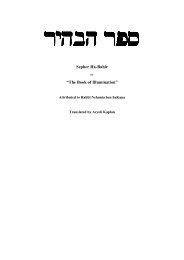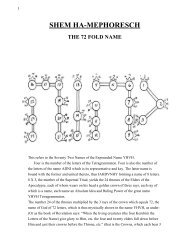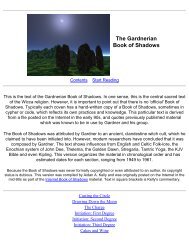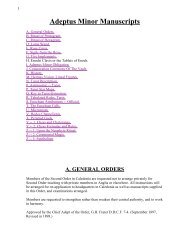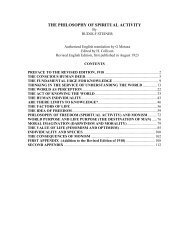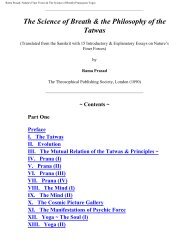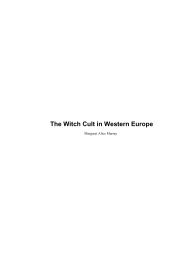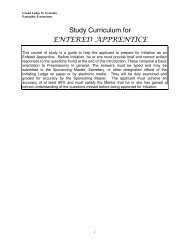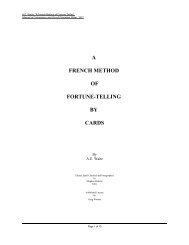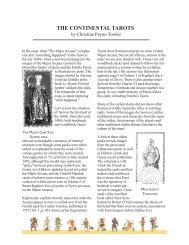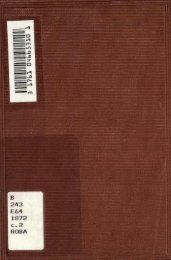Band 2 Anthropogenesis - H.P. Blavatsky
Band 2 Anthropogenesis - H.P. Blavatsky
Band 2 Anthropogenesis - H.P. Blavatsky
You also want an ePaper? Increase the reach of your titles
YUMPU automatically turns print PDFs into web optimized ePapers that Google loves.
From all that has been said in this section, one sees clearly that, between the Serpent of Eden and the Devil of<br />
Christianity, there is an abyss. Alone the sledge hammer of ancient philosophy can kill this dogma.<br />
-------<br />
------------------------------------------------------------------------<br />
[[Vol. 2, Page]] 529 WHO INVENTED WRITING?<br />
§ XXI.<br />
ENOICHION-HENOCH.<br />
THE history of the evolution of the Satanic myth would not be complete if we omitted to notice the character of the<br />
mysterious and Cosmopolitan Enoch, variously called Enos, Hanoch, and finally Enoichion by the Greeks. It is from his<br />
Book that the first notions of the Fallen Angels were taken by the early Christian writers.<br />
The "Book of Enoch" is declared apocryphal. But what is an Apocrypha? The very etymology of the term shows that it is<br />
simply a secret book, i.e., one that belonged to the catalogue of temple libraries under the guardianship of the<br />
Hierophants and initiated priests, and was never meant for the profane. Apocrypha comes from the verb Crypto,<br />
[[krupto]], "to hide." For ages the Enoichion (the Book of the SEER) was preserved in the "city of letters" and secret works<br />
-- the ancient Kirjath-Sepher, later on, Debir (see Joshua xv., 15).<br />
Some of the writers interested in the subject -- especially Masons -- have tried to identify Enoch with Thoth of Memphis,<br />
the Greek Hermes, and even with the Latin Mercury. As individuals, all these are distinct one from the other;<br />
professionally -- if one may use this word, now so limited in its sense -- they belong one and all to the same category of<br />
sacred writers, of Initiators and Recorders of Occult and ancient Wisdom. Those who in the Quran (see Surat XIX.) are<br />
generically termed the Edris, or the "Learned" (the Initiated), bore in Egypt the name of "Thoth," the inventor of arts,<br />
sciences, writing or letters, of music and astronomy. Among the Jews the Edris became "Enoch," who, according to Bar-<br />
Hebraeus, "was the first inventor of writing," books, arts, and sciences, the first who reduced to a system the progress of<br />
the planets. In Greece he was called Orpheus, and thus changed his name with every nation. The number Seven being<br />
attached to, and connected with, each of those primitive Initiators,* as well as the number 365, of the days in the year,<br />
astronomically, it identifies the mission, character, and the sacred office of all those men, but certainly not their<br />
personalities. Enoch is the seventh Patriarch; Orpheus is the possessor of the phorminx, the 7-stringed lyre, which is the<br />
seven-fold mystery of initiation. Thoth, with the seven-rayed Solar Discus on his head, travels in the Solar boat, the 365<br />
degrees, jumping out every fourth (leap) year for one day. Finally, Thoth-Lunus is the septenary<br />
[[Footnote(s)]] -------------------------------------------------<br />
* Khanoch, or Hanoch, or Enoch means the "Initiator" and "teacher," as well as the "Son of Man," Enos (vide Genesis iv.,<br />
26), esoterically.<br />
------------------------------------------------------------------------<br />
[[Vol. 2, Page]] 530 THE SECRET DOCTRINE.<br />
god of the seven days, or the week. Esoterically and spiritually, Enoichion means the "Seer of the Open Eye."<br />
The story about Enoch, told by Josephus, namely, that he had concealed under the pillars of Mercury or Seth his<br />
precious rolls or books, is the same as that told of Hermes, "the father of Wisdom," who concealed his books of Wisdom<br />
under a pillar, and then, finding the two pillars of stone, found the science written thereon. Yet Josephus, notwithstanding<br />
his constant efforts in the direction of Israel's unmerited glorification, and though he does attribute that science (of<br />
Wisdom) to the Jewish Enoch -- writes history. He shows those pillars as still existing during his own time. He tells us that<br />
they were built by Seth; and so they may have been, only neither by the Patriarch of that name, the fabled son of Adam,<br />
nor by the Egyptian god of Wisdom -- Teth, Set, Thoth, Tat, Sat (the later Sat-an), or Hermes, who are all one, -- but by<br />
the "sons of the Serpent-god," or "Sons of the Dragon," the name under which the Hierophants of Egypt and Babylon<br />
were known before the Deluge, as were their forefathers, the Atlanteans.<br />
What Josephus tells us, therefore, must be allegorically true, with the exception of the application made of it. According to<br />
his version the two famous pillars were entirely covered with hieroglyphics, which, after the discovery, were copied and<br />
reproduced in the most secret corners of the inner temples of Egypt, and have thus become the source of its Wisdom and<br />
exceptional learning. These two "pillars," however, are the prototypes of the two "tables of stones" hewn by Moses at the<br />
command of the "Lord." Hence, in saying that all the great adepts and mystics of antiquity -- like Orpheus, Hesiod,<br />
Pythagoras and Plato -- got the elements of their theology from those hieroglyphics, he is right in one sense, and wrong<br />
in another; for he errs in accuracy. The Secret Doctrine teaches us that the arts, sciences, theology, and especially the<br />
philosophy of every nation which preceded the last universally known, but not universal Deluge, had been recorded<br />
ideographically from the primitive oral records of the Fourth Race, and that these were the inheritance of the latter from<br />
the early Third Root-Race before the allegorical Fall. Hence, also, the Egyptian pillars, the tablets, and even the "white<br />
Oriental porphyry stone" of the Masonic legend -- which Enoch, fearing that the real and precious secrets would be lost,<br />
concealed before the Deluge in the bowels of the Earth -- were simply the more or less symbolical and allegorical copies<br />
from the primitive Records. The "Book of Enoch" is one of such copies and is a Chaldean, now very incomplete<br />
compendium. As already said, Enoichion means in Greek the "inner eye," or the Seer; in Hebrew, and with the help of<br />
Masoretic points it means the initiator and instructor, [[hebrew]]. It is a generic title; besides which his legend is<br />
------------------------------------------------------------------------<br />
[[Vol. 2, Page]] 531 THE ADEPT DIES BUT TO LIVE.<br />
that of several other prophets, Jewish and heathen, with changes of made-up details, the root-form being the same. Elijah<br />
is also taken up into Heaven alive; and the astrologer, at the court of Isdubar, the Chaldean Hea-bani, is likewise raised<br />
to heaven by the god Hea, who was his patron, as Jehovah was of Elijah (whose name means in Hebrew "God-Jah,"




